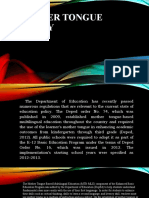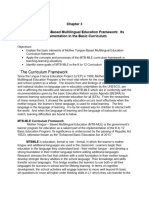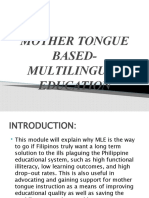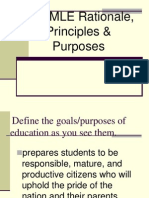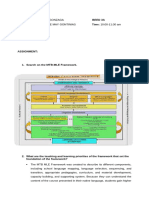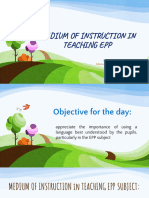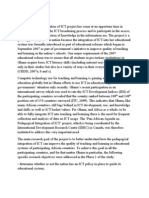Orbuda, Vena Jovie Lhea H. Beed 302 Activity #1 1.what Is MTB-MLE?
Orbuda, Vena Jovie Lhea H. Beed 302 Activity #1 1.what Is MTB-MLE?
Uploaded by
Charlene Fe Pacquiao AmenCopyright:
Available Formats
Orbuda, Vena Jovie Lhea H. Beed 302 Activity #1 1.what Is MTB-MLE?
Orbuda, Vena Jovie Lhea H. Beed 302 Activity #1 1.what Is MTB-MLE?
Uploaded by
Charlene Fe Pacquiao AmenOriginal Title
Copyright
Available Formats
Share this document
Did you find this document useful?
Is this content inappropriate?
Copyright:
Available Formats
Orbuda, Vena Jovie Lhea H. Beed 302 Activity #1 1.what Is MTB-MLE?
Orbuda, Vena Jovie Lhea H. Beed 302 Activity #1 1.what Is MTB-MLE?
Uploaded by
Charlene Fe Pacquiao AmenCopyright:
Available Formats
ORBUDA, VENA JOVIE LHEA H.
BEED 302
Activity #1
1.What is MTB-MLE?
Mother Tongue-Based Multilingual Education (MTB MLE) programs serve learners
of non-dominant language communities who do not understand or speak the
language of instruction when they begin their formal education.
In MTB MLE programs, students begin with what they know—their language and
culture, knowledge and experience—as the foundation for learning in school. Well-
planned and well-implemented MTB MLE programs produce students who are
multilingual and multicultural and who contribute to their community’s and their
nation’s development goals.
2.What is the purpose of MTB-MLE?
To develop appropriate cognitive and reasoning skills enabling children to operate
equally in different languages – starting in the mother tongue with transition to Filipino
and then English and to preserve the Philippine cultural treasure as well.
3.What is the meaning of Mother tongue based multil-lingual education?
Mother tongue education refers to any form of schooling that makes use of the
language or languages that children are most familiar with. This is usually the language
that children speak at home with their family. The ‘mother tongue’ does not have to be
the language spoken by the mother. Children can and often do speak more than one or
even two languages at home. For example, they may speak one language with their
mother, another with their father and a third with their grandparents. Children who speak
a different language at home than the language in which they are taught at school will
by definition become bilingual or multilingual. The degree to which they become
bilingual may vary considerably however and depends on the goal of the school
programme.
4.Why is mother tongue implemented?
Mother Tongue Based-Multilingual Education (MTB-MLE) has carved its niche as a
practical and effective approach in the educational landscape. It offers a plausible
framework for preparing coming generations to become better adaptive and even rich
contributors in the globalized and intercultural world. The gate to the new millennium
has brought great zeal in and at the same time contestations around this educational
alternative.
ORBUDA, VENA JOVIE LHEA H. BEED 302
ACTIVITY #2
1. What is the purpose of MTB-MLE?
The purpose of MTB-MLE is to develop appropriate cognitive and reasoning skills enabling children
to operate equally in different languages – starting in the mother tongue with transition to Filipino and
then English and to preserve the Philippine cultural treasure as well
2. What is the meaning of mother tongue multilingual education?
MOTHER TONGUE BASED- MULTILINGUAL EDUCATION MLE refers to “first-language-first”
education, that is schooling which begins in the mother tongue and transitions to additional
languages. MLE is the use of more than two languages for literacy and instruction. It starts from
where the learners are, and from what they already know. This means learning to read and write in
their first language or L1, and also teaching subjects like mathematics, science, health, and social
studies in the L1.
3. Do you think Mtb-MLE is effective?
Children learn better in their mother tongue. UNESCO has encouraged mother tongue
instruction in primary education since 1953 (UNESCO, 1953) and UNESCO highlights
the advantages of mother tongue education right from the start: children are more likely
to enroll and succeed in school (Kosonen, 2005); parents are more likely to
communicate with teachers and participate in their children’s learning (Benson, 2002);
girls and rural children with less exposure to a dominant language stay in school longer
and repeat grades less often (Hovens, 2002; UNESCO Bangkok, 2005); and children in
multilingual education tend to develop better thinking skills compared to their
monolingual peers (e.g., Bialystok, 2001; Cummins, 2000; King & Mackey, 2007).Some
educators argue that only those countries where the student’s first language is the
language of instruction are likely to achieve the goals of Education for All. Research
also suggests that engaging marginalized children in school through mother-tongue
based, multilingual education (MTB-MLE) is a successful model (Benson & Kosonen,
2013; Yiakoumetti, 2012).
4.what depedorder issuances the implementati neson of mtbmle?
DepEd Order No. 16 series of 2012, "Guidelines on the implementation of the Mother Tongue
Based-Multilingual Education (MTB-MLE) Tagalog Kapampangan Pangasinense Iloko Bikol
Cebuano Hiligaynon Waray Tausug Maguindanaoan Maranao Chabacano.
You might also like
- Orbuda, Vena Jovie Lhea H. Beed 302 Activity #1 1.what Is MTB-MLE?Document5 pagesOrbuda, Vena Jovie Lhea H. Beed 302 Activity #1 1.what Is MTB-MLE?Charlene Fe Pacquiao AmenNo ratings yet
- MTB MleDocument32 pagesMTB MleJinley SalvoNo ratings yet
- Lesson 2 - MTBDocument4 pagesLesson 2 - MTBFrezilla NoblesNo ratings yet
- Content and Pedagogy For The Mother Eed Mtb-Mle 363: TongueDocument8 pagesContent and Pedagogy For The Mother Eed Mtb-Mle 363: TongueGrace Paton-ogNo ratings yet
- Mother Tongue Based Multilingual Education (Mtb-Mle) in The PhilippinesDocument20 pagesMother Tongue Based Multilingual Education (Mtb-Mle) in The PhilippinesLiecel CaldeoNo ratings yet
- Module30 - Mother Tongue Based - Multilingual EducationDocument9 pagesModule30 - Mother Tongue Based - Multilingual EducationMa. Ylizza Niña ReganionNo ratings yet
- Lesson 3 - MTBDocument6 pagesLesson 3 - MTBFrezilla NoblesNo ratings yet
- SC MTB Mle 311 PDFDocument60 pagesSC MTB Mle 311 PDFAbby CabiloNo ratings yet
- Notes (Net) para Sa KritikaDocument4 pagesNotes (Net) para Sa KritikaClaire CastillanoNo ratings yet
- Group 2 (Finals)Document28 pagesGroup 2 (Finals)Renelyn Rodrigo Sugarol100% (1)
- Mother Tongue Multilingual EducationDocument6 pagesMother Tongue Multilingual EducationSteven OmbegaNo ratings yet
- EL104 Topic 14 Mother Tongue Based Multilingual EducationDocument14 pagesEL104 Topic 14 Mother Tongue Based Multilingual EducationEdmelyn Natad BacusmoNo ratings yet
- Mother Tongue PolicyDocument5 pagesMother Tongue PolicyLovely Mahinay Capul100% (1)
- Meycauayan College: Graduate SchoolDocument4 pagesMeycauayan College: Graduate SchoolMary Grace Gevera SaludaresNo ratings yet
- Mother Tongue Multilingual EducationDocument8 pagesMother Tongue Multilingual EducationkarlNo ratings yet
- MTB MleDocument27 pagesMTB Mleror Wie100% (1)
- Lesson 2: Mother Tongue Based-Multilingual Education (Mtb-Mle)Document4 pagesLesson 2: Mother Tongue Based-Multilingual Education (Mtb-Mle)Jayson CincoNo ratings yet
- Chapter 5 Multilingual PhilippinesDocument53 pagesChapter 5 Multilingual Philippinesangelica100% (2)
- ST2 PPT ReportDocument76 pagesST2 PPT ReportJoshua Bryce ElisanNo ratings yet
- Class Module in Content and Pedagogy For The Mother-TongueDocument103 pagesClass Module in Content and Pedagogy For The Mother-TongueKarlyn Antona100% (2)
- What Is The MLE Innovative Approach To Learning?Document3 pagesWhat Is The MLE Innovative Approach To Learning?vea verzonNo ratings yet
- Unit 1: Mother TongueDocument44 pagesUnit 1: Mother TongueEUCHELLEMAE ARILANo ratings yet
- Group 2 (Written Notes)Document6 pagesGroup 2 (Written Notes)Renelyn Rodrigo SugarolNo ratings yet
- Chapter 3Document8 pagesChapter 3Domi NyxNo ratings yet
- MTB-MLE - Mother Tongue Based Multi-Lingual EducationDocument5 pagesMTB-MLE - Mother Tongue Based Multi-Lingual EducationIrishjoy VirayNo ratings yet
- Mother Tongue Module 1Document14 pagesMother Tongue Module 1Sunny RoseNo ratings yet
- Mother Tongue Policy Report AbanteDocument28 pagesMother Tongue Policy Report AbanteJean Aireen Bonalos Espra100% (1)
- Research On Multigrade TeachersDocument43 pagesResearch On Multigrade TeachersEly Boy AntofinaNo ratings yet
- Mother Tongue Based-Multilingual EducationDocument50 pagesMother Tongue Based-Multilingual EducationAira Mae Regua VenturanzaNo ratings yet
- Implementation of Mother Tongue - Based Multilingual Education in A Multicultural and Multilingual Community: A Teacher's PerspectiveDocument19 pagesImplementation of Mother Tongue - Based Multilingual Education in A Multicultural and Multilingual Community: A Teacher's PerspectivePsychology and Education: A Multidisciplinary Journal100% (1)
- Mother Tougue BasedDocument6 pagesMother Tougue BasedEUCHELLEMAE ARILANo ratings yet
- MTB Mle LiteracyDocument4 pagesMTB Mle Literacyror Wie100% (1)
- Special Topic (Mother Tongue Based Education)Document32 pagesSpecial Topic (Mother Tongue Based Education)Rose DumayacNo ratings yet
- MTB MLE ResearchDocument62 pagesMTB MLE ResearchJohn ValenciaNo ratings yet
- Content and Pedagogy in MTBMLE Week 1Document13 pagesContent and Pedagogy in MTBMLE Week 1Jamaica Haduca Ballera100% (2)
- Deped Order #74 S.2009-Institutionalizing The Use of MleDocument6 pagesDeped Order #74 S.2009-Institutionalizing The Use of MleAndrei VenusNo ratings yet
- He Understands, That Goes To His Head. If You Talk To Him in His Language, That Goes To His Heart. Mother Tongue-Based Multilingual Education (MTBDocument4 pagesHe Understands, That Goes To His Head. If You Talk To Him in His Language, That Goes To His Heart. Mother Tongue-Based Multilingual Education (MTBmelchieNo ratings yet
- The Mother Tongue Approach in The Basic EducationDocument7 pagesThe Mother Tongue Approach in The Basic EducationLucille Gacutan AramburoNo ratings yet
- PEDAGOGYModule #1 BEED2Document9 pagesPEDAGOGYModule #1 BEED2Salve BayaniNo ratings yet
- Challenges in TeachingDocument55 pagesChallenges in TeachingHELEN VIOLENTA100% (1)
- React On The Use of Mother Tongue in Teaching Lessons For Grades 1 and 2Document5 pagesReact On The Use of Mother Tongue in Teaching Lessons For Grades 1 and 2Vev'z Dangpason BalawanNo ratings yet
- Mother Tongue Based-Multilingual EducationDocument23 pagesMother Tongue Based-Multilingual Educationsweetzel paigmaneNo ratings yet
- EMT 301 Module 3Document6 pagesEMT 301 Module 3ANGEL ROY LONGAKITNo ratings yet
- LPPMS DelossantosDocument6 pagesLPPMS DelossantosnhiicamarceloNo ratings yet
- Mother Tongue and K-12 Curriculum Content and PedagogyDocument41 pagesMother Tongue and K-12 Curriculum Content and PedagogyJean Aireen Bonalos Espra86% (7)
- 21 Reasons Why Children Learn Better While Using Their Mother TongueDocument4 pages21 Reasons Why Children Learn Better While Using Their Mother TongueMark CabugwasNo ratings yet
- Power Point Presentation Mother Tongue Based Models of Multilingual EducationDocument30 pagesPower Point Presentation Mother Tongue Based Models of Multilingual Educationservidadveronica100% (2)
- Mother Tongue-Based Multilingual EducationDocument40 pagesMother Tongue-Based Multilingual EducationAime Roswell100% (1)
- DEPED 2012 - K TO 12 - MTB RationaleDocument30 pagesDEPED 2012 - K TO 12 - MTB Rationaleyachiru121100% (3)
- Michelle Baguinat - ModuleDocument8 pagesMichelle Baguinat - ModuleAnnabeth Chase100% (1)
- Lingg 1 InfographicDocument3 pagesLingg 1 InfographicChristian AganoNo ratings yet
- TEGR 116 Module 1 Slide 1 To 42Document42 pagesTEGR 116 Module 1 Slide 1 To 42chechebasister6No ratings yet
- Module 4 in Mother Tongue - 090900Document16 pagesModule 4 in Mother Tongue - 090900Andy Barojabo JepolloNo ratings yet
- Framework MTB MleDocument2 pagesFramework MTB Mlejademartha14No ratings yet
- Ball UNESCO Bilingual and Multilingual-SummarizedDocument91 pagesBall UNESCO Bilingual and Multilingual-SummarizedbellkarganillNo ratings yet
- MT ReportDocument29 pagesMT ReportROGER CHINGNo ratings yet
- MTB MleDocument21 pagesMTB MleSARAH JANE CAPSANo ratings yet
- Content Pedagogy For Mtb-Mle (AS10 ECE 9) : Language IncludesDocument11 pagesContent Pedagogy For Mtb-Mle (AS10 ECE 9) : Language IncludesMichelle SalvadorNo ratings yet
- Medium of Instructions in Teaching EppDocument13 pagesMedium of Instructions in Teaching EppMeng VillareNo ratings yet
- The Essentials: Dual Language Learners in Diverse Environments in Preschool and KindergartenFrom EverandThe Essentials: Dual Language Learners in Diverse Environments in Preschool and KindergartenNo ratings yet
- Art21 Learning With Art 21 Guide 1Document10 pagesArt21 Learning With Art 21 Guide 1paul6142No ratings yet
- Final Paper 207Document10 pagesFinal Paper 207Cristian PaderesNo ratings yet
- Mrs Rabi Isma - Kano Pres (RI)Document10 pagesMrs Rabi Isma - Kano Pres (RI)Sadiq MahmoudNo ratings yet
- The Information in The Modern AgeDocument21 pagesThe Information in The Modern Ageedwin t. salvaneraNo ratings yet
- Candy Life Long LearningDocument16 pagesCandy Life Long Learningabu abdullahNo ratings yet
- Square PandaDocument30 pagesSquare PandaSEO IndiaNo ratings yet
- Jezell PR3 Final 123Document41 pagesJezell PR3 Final 123Jezell Bierneza NadonNo ratings yet
- AILiteracy101 June2024FDocument157 pagesAILiteracy101 June2024FRw KhNo ratings yet
- Literacy and The Young Learners: EGED 110Document24 pagesLiteracy and The Young Learners: EGED 110RODALYN M. SOLIS100% (1)
- Survey QuestionnaireDocument5 pagesSurvey QuestionnaireNoel Balares100% (1)
- (Subject Matter) : V RxqtkhrkwicDocument6 pages(Subject Matter) : V RxqtkhrkwicMAE HERNANDEZNo ratings yet
- ICT PresentationDocument10 pagesICT PresentationEdwin Okoampa BoaduNo ratings yet
- Language and Text Structure Across DisciplinesDocument7 pagesLanguage and Text Structure Across DisciplinesPrincess Shoebelyn Cañete MauricioNo ratings yet
- Media Information LiteracyDocument5 pagesMedia Information LiteracyLexter PlacienteNo ratings yet
- Modern International Large Scale Assessment in Education - 40536-021-00109-1Document33 pagesModern International Large Scale Assessment in Education - 40536-021-00109-1icollinsonNo ratings yet
- Reading StrategiesDocument73 pagesReading StrategiesChristina KiuNo ratings yet
- Eastern Michigan University Written Communication MajorDocument2 pagesEastern Michigan University Written Communication MajorDerekMuellerNo ratings yet
- The Promise of ICTs in EducationDocument19 pagesThe Promise of ICTs in EducationRanjit SlathiaNo ratings yet
- Validation SheetsDocument13 pagesValidation SheetsErmaflor Prequencia VillanuevaNo ratings yet
- Important Aspects of Women Empowerment in Assam and IndiaDocument10 pagesImportant Aspects of Women Empowerment in Assam and IndiaJing Garcia-NariaNo ratings yet
- Primary Science FPD 5esDocument19 pagesPrimary Science FPD 5esapi-444358964No ratings yet
- Beed Iii - Teaching English SyllabiDocument14 pagesBeed Iii - Teaching English SyllabiLerramie Dela PeñaNo ratings yet
- Sinuraes Pillar1Document65 pagesSinuraes Pillar1Rizalina LaysonNo ratings yet
- New Normal eCR SHSDocument24 pagesNew Normal eCR SHSCHEENY TAMAYONo ratings yet
- Literacy LevelsDocument4 pagesLiteracy LevelsMaría Andrea ReyesNo ratings yet
- Power and Agency in Education: Exploring The Pedagogical Dimensions of Funds of KnowledgeDocument34 pagesPower and Agency in Education: Exploring The Pedagogical Dimensions of Funds of KnowledgeGustavo González GarcíaNo ratings yet
- The Effect of Having Financial Problem TDocument57 pagesThe Effect of Having Financial Problem Tshaneabella96No ratings yet
- Repubic of Trinidad and Tobago Ministry of Education: Secondary Education Modernization ProgrammeDocument60 pagesRepubic of Trinidad and Tobago Ministry of Education: Secondary Education Modernization ProgrammeShunaya JosephNo ratings yet
- Dett 607 Storyboard Schambers PDFDocument54 pagesDett 607 Storyboard Schambers PDFapi-280365888No ratings yet
- MilDocument4 pagesMilGlenda AstodilloNo ratings yet












